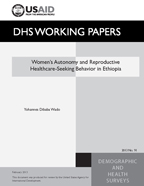
Abstract:
This paper investigates the potential
importance of women’s autonomy in the
reproductive healthcare-seeking behavior of
women in Ethiopia. We hypothesized that
women’s autonomy influences their
reproductive healthcare-seeking behavior
independent of maternal socio-demographic
characteristics. We tested this hypothesis
using data from the 2005 Ethiopian
Demographic and Health survey (EDHS). Women’s
autonomy was measured by women’s
participation in domestic decision making,
attitudes toward wife beating, attitudes
toward refusing sex with husband, and whether
women said that getting permission to seek
medical care is a big problem.
Our analysis shows that women’s autonomy is
an important influence on their reproductive
healthcare-seeking behavior. Women’s
participation in domestic decision making is
strongly associated with ever-use of family
planning, but not with use of antenatal care,
after controlling for socio-demographic
factors. In the multivariate model the lack
of association between women’s participation
in decision making and antenatal care is
mediated by factors such as women’s education
and place of residence. Women’s attitudes
toward refusing sex with husband, an
indicator of gender-role attitudes, and the
ease of getting permission to seek medical
help are significantly associated with both
ever-use of contraception and use of
antenatal care services, after controlling
for the effects of other socio-demographic
variables.
These findings suggest that women’s autonomy
at the household level, including freedom of
movement, is important to their use of
reproductive health services. Moreover, for
both outcome variables, women’s education,
paid employment, urban residence, exposure to
media, and wealth appear as important
predictors. The findings highlight the need
in Ethiopia for
initiatives to improve women’s autonomy, to
attain both gender equality and wider use of
health services. Moreover, improving women’s
education and employment can play a dual role
in enhancing women’s autonomy and
healthcare-seeking behavior.
 Women's Autonomy and Reproductive Healthcare-Seeking Behavior in Ethiopia (PDF, 541K)
Women's Autonomy and Reproductive Healthcare-Seeking Behavior in Ethiopia (PDF, 541K)
